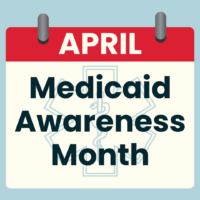Medicaid Awareness Month
Medicaid provides essential health coverage for over 90 million low-income individuals in the United States. At Legal Council, we know how important Medicaid is to the clients and communities that we serve every day.
April is Medicaid Awareness Month. Today we are highlighting three features of Illinois Medicaid—Early and Periodic Screening, Diagnostic, and Treatment (EPSDT) Services, Telehealth Services, and Behavioral Health Services—and how they benefit our client communities.
Early and Period Screening, Diagnostic, and Treatment (EPSDT) Services:
These services are available to all children and youth under 21 enrolled in Medicaid and are key to ensuring they get the right preventive, dental, mental health, and developmental services when they need them.
“9 out of 10 children under 18 within our Children and Families program have a disability. EPSDT provides medically necessary care for all low-income children and is a resource especially important for children with complex health needs,” said Katie Shelton (she/her), Legal Director of our Children and Families Program. “By providing a range of benefits beyond those available to Medicaid-eligible adults or through most employer-based insurance, EPSDT helps prevent adverse long-term consequences of untreated or undertreated conditions in kids so they can go on to live happy, healthy adult lives.”
Behavioral Health Services:
Illinois covers a wide variety of behavioral health services, from therapy to crisis response services. Our Homeless Outreach Program (HOP) knows how critical these services are for many of the communities we work with.
“In 2023, we worked with over 300 individuals experiencing homelessness, many of whom also have mental health challenges and/or struggle with substance use. Services like these help ensure that once an individual is stably housed, they can remain stably housed, and with improved well-being,” said Kate Miller (she/he), Senior Legal Advocate in our HOP.
Unfortunately, coverage of such services does not always imply better access to these services—Medicaid’s reimbursement rate to behavioral health providers is concerningly low. Services are covered, but finding providers who accept Medicaid coverage is difficult. At Legal Council, we have been diligently advocating for policies that will ensure the program has sufficient mental health providers for all Illinoisans.
“Oftentimes, our work to obtain public benefits for individuals experiencing homelessness can take months to complete,” said Kate. “We spend time collaborating with our clients to find the right fit in health care. This is a critical aspect—connecting our clients to behavioral health and substance use services throughout representation truly cannot be understated. The primary reason is that people need options to recover and heal. The second is that benefits are rarely obtained without substantial treatment. It’s critical that we continue to fight for improved access to these covered services.”
Telehealth Services:
During the pandemic, the state of Illinois took advantage of the federal government’s option to bill Medicaid more broadly for telehealth visits, providing more coverage of and continuity in care for its recipients. While Illinois is still working on a vision for the scope of post-COVID telehealth coverage, provider and patient comfort levels with this type of healthcare delivery has certainly increased.
“At Legal Council, 80% of our clients are living with a disability or chronic condition. These folks may be more susceptible to illness in public spaces or have difficulty traveling to and from medical appointments. Telehealth can remove significant barriers to care for this population,” said Theo Grant-Funck, Legal Advocate on our Children and Families team. “Of course, a one-size-fits-all healthcare delivery model does not work. It’s crucial that we continue to pay close attention to access issues in both in-person and telehealth services so no population is left behind.”
—
While Illinois Medicaid has grown stronger in recent decades, a great deal of work remains. It is crucial that we continue to look critically at our state’s Medicaid policies and procedures, and use tools from our advocacy toolbox to promote greater access to and coverage of care for all populations. Legal Council is committed to using our three-tiered approach—direct representation, outreach and education, and systems change—to ensure Medicaid works for everyone, especially marginalized communities.


